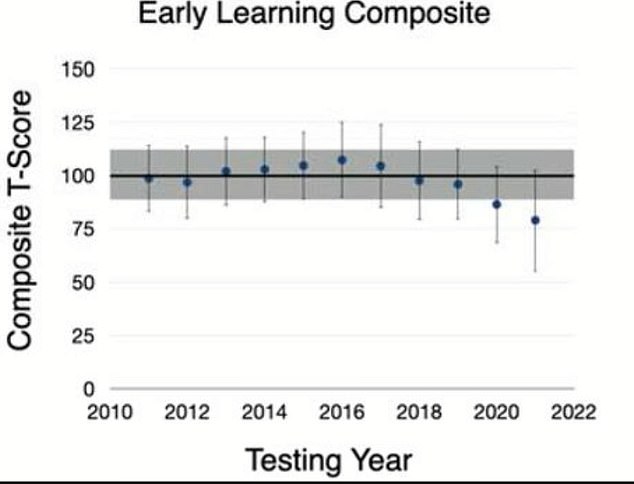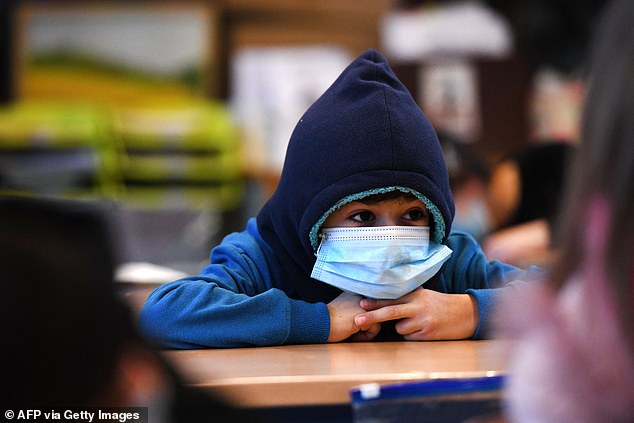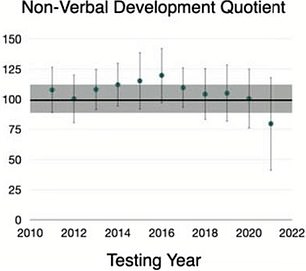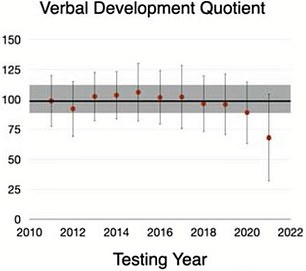- Face masks and other social distancing measures may in fact impede on children’s development, a new study executed by Brown University has found
- The probe analyzed the cognitive development of the youngsters through infancy, childhood and adolescence
- In the study, researchers first analyzed 1,070 assessments administered on 605 kids prior to March 2020, when COVID lockdowns and masking began
- A further 154 assessments from 118 kids administered between March 2020 and June 2021, during the height of the pandemic, were then carried out
- Thirty-nine children born in 2018 and 2019 were analyzed over the course of the pandemic, into 2021.
- The report found that there was a 23 per cent drop in scores measuring kids’ intelligence quotients since the start of the pandemic
- The study also found similar dips in the same span in regards to developing children’s ability to communicate, both verbally and though subtle facial cues
By Alex Hammer For Dailymail.Com
Published: 16:54 EST, 26 November 2021
Social distancing measures including face masks are suspected of causing young children’s development to have drop by up to 23 per cent during the COVID pandemic, according to a new study.
Brown University scientists Sean CL Deoni, Jennifer Beauchemin, Alexandra Volpe, and Viren D’Sa, penned the review, in conjunction with the global consulting firm Resonance, collecting data from 1,600 children – and their caregivers – who have been enrolled in the study between the ages of 0 and 5 on a rolling basis.
The probe analyzed the cognitive development of the youngsters through infancy, childhood and adolescence, and looked at how average development scores in three key areas had been affected during the COVID era – with shocking results. 
The report found that there was a 23 per cent drop in scores measuring kids’ intelligence quotients since the start of the pandemic. Results showed the early learning composite mean result dropped by a whopping 23 per cent, from a high of just under 100 in 2019, to 77 in 2021
In the study, researchers first analyzed 1,070 assessments administered on 605 kids prior to March 2020, when COVID lockdowns and masking began.
Then, a further 154 assessments from 118 kids administered between March 2020 and June 2021, during the height of the pandemic, were carried out.
Meanwhile, 39 children born in 2018 and 2019 were analyzed over the course of the pandemic, into 2021.
The team then carried out checks on three widely accepted measures of child development – the early learning composite (ELC), verbal development quotient (VDQ), and non-verbal development quotient (NVDQ).
A child’s early learning composite is derived from their fine motor, visual reception, receptive, and expressive language scales, and is the early years equivalent to an IQ score.
The two development quotients measures how well a child is maturing in their language skills and other skills as compared with a sample of youngsters their own age.
The study’s findings come as parents across the globe grapple with the idea that wearing masks may interfere with the natural learning experiences and communication skills of their young children
Results showed the early learning composite mean result dropped by a whopping 23 per cent, from a high of just under 100 in 2019, to around 80 in 2020, and finally 77 in 2021.
Meanwhile, the verbal development quotient also dropped dramatically, from an average of 100 in 2018 to just below 90 in 2020, and around 70 in 2021.
The non-verbal development quotient also experienced a similar dip, from a mean score of around 105 in 2019, to 100 in 2020 and around 80 in 2021.
The study concluded that ‘children born during the pandemic have significantly reduced verbal, motor, and overall cognitive performance compared to children born pre-pandemic.’
‘In addition,’ the report adds, ‘masks worn in public settings and in school or daycare settings may impact a range of early developing skills, such as attachment, facial processing, and socioemotional processing.’


Two tests determining kids’ development quotients were conducted as well, illustrating marked drops since the start of the pandemic concerning how well children are maturing in their language skills and other skills as compared with a sample of youngsters their own age
The authors said that boys from poor backgrounds were most at risk of a drop in cognitive testing scores, with richer parents better able to mitigate the effects of the pandemic.
They explained: ‘Comparing yearly mean scores since 2011, controlling for age, gender, demographic, and socioeconomic indicators, we find striking evidence of declining overall cognitive functioning in children beginning in 2020 and continuing through 2021.
‘We find that males appear significantly more impacted than females, and that higher socioeconomic status (SES, as measured by maternal education) helps buffer against this negative impact.
‘On a more individual level, we examined longitudinal pre and during-pandemic trends in the same children from 2018 to 2021, again finding declines in ability in 2020 and 2021.’
_______________________________
If you are looking for solutions (lawyer, form, gathering, action, antidote, maybe this could help you:
HERE
If you like our work please consider to donate :




Related posts:
Views: 0
 RSS Feed
RSS Feed

















 November 30th, 2021
November 30th, 2021  Awake Goy
Awake Goy  Posted in
Posted in  Tags:
Tags: 
















